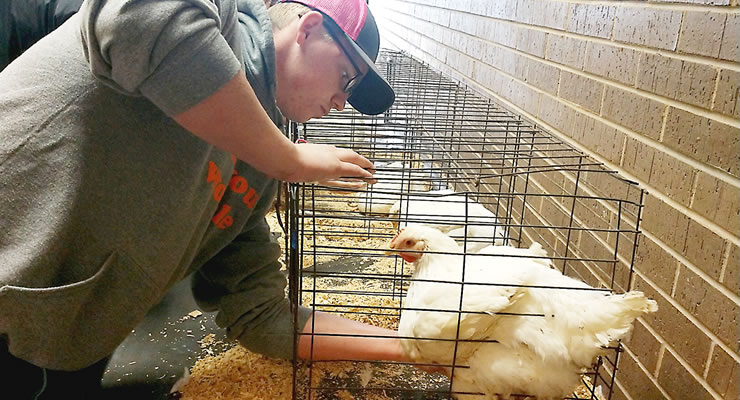The seventh annual Chance Mark Jones Roar & Run 5K will be held April 13 at Clarendon College in conjunction with national Child Abuse Awareness Month.
Early bird registration for the event closed Wednesday. Those who haven’t registered can still do so through next week for $25 at the Clarendon Visitor Center, although t-shirts may not be available for late registrants.
Race packets will be available for pick-up all day Friday, April 12, at the Visitor Center.
Proceeds from the race will benefit the charitable community activities of the Clarendon Lions Club. The race honors the life of four-year-old Chance Mark Jones, who died from abuse in 2011.
For more information about this weekend’s Chance Mark Jones Roar & Run 5K, contact Lion Ashlee Estlack at 662-4687 or Lion Roger Estlack at 874-2259.
Archives for April 2019
College, hospital district exempt from House tax bill
By Shannon Najmabadi, Texas Tribune
With additional reporting by Roger Estlack, Clarendon Enterprise
Clarendon College and the Donley County Hospital District would be exempt from property tax reform and some other taxing units may be cushioned from the changes if a bill passed out of the Texas House of Representatives becomes law.
CC President Robert Riza spoke on behalf of Clarendon and the 49 other community colleges in Texas when he testified before the House Ways & Means Committee on February 27.
“We’re nowhere near done, but we feel good with the house vote,” Riza said.
Texas House Republicans muscled a heavily altered version of their property tax reform bill through a committee early last Thursday, notching a single Democratic vote and swiftly shooting down attempts to further modify the draft.
A top priority for state leaders, House Bill 2 would require cities, counties and other taxing units to receive voter approval before levying 2.5 percent more property tax revenue than the previous year. A vote was expected to come Wednesday morning on a new draft of the legislation, which contains changes likely to appease small and special taxing units but leave big municipal leaders staunchly opposed.
But the hearing on the new version was postponed until past midnight. The 16-hour delay gave an unusual cluster of critics time to trumpet their concerns with the measure – and then for top House leaders to respond in an informal late-night news conference.
“Sometimes when everyone’s a little bit upset with you, maybe you have a good balance – that’s probably a good sign,” said House Ways and Means Committee Chair Dustin Burrows, the author of the legislation and a Lubbock Republican. “We worked really hard; we talked to a lot of different constituencies” and a lot of members. “I think you’ll see in the committee substitute, the work product and a lot of collaboration.”
Riza says 2.5 percent would limit Clarendon College to only being able to raise taxes by $14,526, which is not enough money to pay anyone full time even at $7 per hour.
“When the state’s share of community college funding goes from 66 percent to 23 percent over 30 years and you also want to limit our ability to raise taxes, the only place we have left to go is tuition and fees,” Riza said. “I think when I put it that way, I got some attention.”
As amended, HB 2 now exempts community colleges, emergency service districts and hospital districts from abiding by the 2.5 percent election trigger. Another provision lets certain districts, including cities and counties, bank unused revenue growth, so long as they average below 2.5 percent over five years. And new “revenue enrichment” language could cushion some taxing units by letting them raise $250,000 in new property taxes a year, even if it exceeded the growth rate. The threshold, set at $250,000 for 2020, would be adjusted by the state comptroller annually, based on inflation.
The carry-over and revenue enrichment provisions do not apply to taxing units exempt from the lower 2.5 percent election trigger; those entities would be subject to an automatic election if annual revenue growth surpassed 8 percent. Taxes raised on new developments remain excluded from the revenue growth calculation.
Democrats on the committee offered four amendments, all quickly defeated in party-line votes.
Currently, voters can petition for an election if property tax revenue growth exceeds 8 percent, a rate set during a period of high inflation in the 1980s. State leaders have touted the lower chamber’s proposal and a Senate companion as an overdue correction and as a needed check on spiraling property tax bills. But critics say the reform efforts would not reduce tax bills, just slow the rate at which they grow – and, in the process, hamper local officials’ ability to provide public services for growing populations.
Chief among the legislation’s detractors have been city and county leaders.
In a letter sent in February to Burrows, a coalition of mayors said the 2.5 percent trigger was not “workable” – but that they were “committed to working with you and your fellow legislators as we strive to make real progress on these issues.” They thanked the legislators for initially exempting money earmarked for debt payments from the revenue growth calculations.
A change in the draft bill could earn those officials’ ire: New certificates of obligation and other non-voter approved debt now count toward the 2.5 percent growth tally. A form of tax revenue-backed debt, the certificates are supposed to offer local governments the flexibility to fund services under exigent circumstances. But the financing method has proven controversial to some state officials, who say it can leave voters on the hook for projects they did not approve.
Bennett Sandlin, executive director of the Texas Municipal League, said the new approach to debt is a “step backwards” that would render certificates of obligation “almost unusable.”
“Cities use certificates of obligation when they have to act quickly, in times of emergency,” Sandlin said. The benefits of the carry-over provision could also be minimal at 2.5 percent, he said, due to inflation.
A vote was called on the new draft around 1 a.m., drawing support from the seven Republicans on the panel and one Democrat, state Rep. Ryan Guillen, a Rio Grande City Democrat and the vice chair of the committee. The three remaining Democrats were opposed.
“This is not the last chapter in the bill”
The latest version of HB 2 was expected to be voted on Wednesday morning. But Burrows gaveled the committee in with the announcement that they wouldn’t pick up the high-priority bill until the lower chamber adjourned for the day. With state budget negotiations set to be taken up on the House floor, marathon proceedings that have historically lasted all night, the news was greeted with surprise.
“Is the committee going to provide us with some Red Bull?” asked state Rep. Trey Martinez Fischer, a San Antonio Democrat. He later told reporters that some of the Democrats’ suggestions were not included in the new draft and that the rollout had been a “disappointment.”
The tone was markedly more collegial after the 16-hour interlude.
Burrows, Martinez Fischer and state Reps. Sheryl Cole and Eddie Rodriguez, both Austin Democrats, expressed appreciation for the cooperative tenor of the work behind the scenes.
“Everybody on this committee has been working hard to find a solution,” said Martinez Fischer, who noted some changes he favored were included in the new draft. “I’m disappointed at this juncture that those conversations haven’t manifested in policy I’m looking for and members of the committee” are looking for.
“I know this is not the last chapter in this bill,” he said.
The new version also provoked early pushback from the opposite end of the political spectrum. Michael Quinn Sullivan, head of the hard-right Empower Texans group, warned readers in an email Wednesday that the committee was not taking a conservative enough approach to the legislation. Lower chamber leaders, he wrote, were preparing to “sell out taxpayers” and “gut” the priority reform measure.
The new draft will head to the Calendars Committee and then to the House, where it will be debated by the full chamber. The Senate’s measure, which was quickly pushed through the chamber’s Property Tax Committee in February, was modified to allow small taxing units to opt in to parts of the reform bill. As first drafted, cities, counties and special taxing districts – like those for community colleges and certain hospitals – were exempted if their sales and property tax levies did not top $15 million.
Both chambers’ versions of the legislation also make a host of widely supported modifications to the appraisal and protest process, with an aim of making them friendlier to taxpayers.
Neither measure has been debated on the floor of its respective chamber.
City pool redesign underway
Clarendon’s proposed water recreation facility is already being redesigned as city leaders get ready to bid the project a third time, according to information presented at last Thursday’s city council meeting.
Mayor Sandy Skelton said he and City Administrator David Dockery had a frank conversation with facility engineer Waters Edge Aquatic Design about the money available for the project, the time lost, and the unaffordability of the original design.
Designer Dave Swartz agreed with Skelton’s points and also agreed to redesign the facility at no charge to the city.
The new design is based on the city’s base budget of $1.86 million and on the bids that have come in twice now at levels that have surprised Swartz as well as the city.
“They are used to bids of around $500 per square foot of water surface, but our bids came in around $680 per square foot,” Skelton said.
The high bids have again been blamed on skyrocketing steel and concrete costs, Skelton said.
The new design will be a smaller rectangular design that will be cheaper to construct that the more complicated curved pool originally designed, the mayor said. Cost savings will also come from housing the bathhouse, concessions, and pump equipment in one building instead of two and from reducing the depth of the pool at the diving board by having a half-meter high diving board instead of a full meter. Other cost savings are also possible as the redesign moves forward.
The new design of the pool will have to get a new approval to meet the Americans with Disabilities Act and get the okay of the Texas Parks & Wildlife Department before it can go to bid.
Skelton said that Swartz still believes the project can be opened for the 2020 summer season but Skelton and Dockery think 2021 is probably more realistic.
In other city business, aldermen appointed Bunni Owens and Wilma Lindley as the judge and alternate judge for the upcoming city election this May and approved a donation of $1,000 to the Donley County Senior Citizens program.
The council also considered and approved the creation of sub-supervisory positions in the water, street, and sanitation departments to begin a succession plan for future leadership of those areas of the city. The plan created a foreman position in each department to work under the current supervisor to begin learning more about the department and to take charge in the supervisors’ absence.
Public Works Director John Molder and Sanitation Director Joe Neal Shadle spoke in favor of the plan.
“I thought I was prepared when (former city superintendent) Jim Roberts died,” Molder said, “but, boy, was I wrong. It takes years to learn all this”
Under the plan, Brad Hagood, Raul Mendoza, and Danny Gaines will become foremen in the water, street, and sanitation departments respectively. Each man will receive a $2 per hour increase in salary and be expected to finish additional trainings, licensing, or certifications.
In his administrator’s report, Dockery reported that the city had received an award for collecting 93 tons of recycling last year and said the sanitation department and the citizens of Clarendon are to be commended for those efforts.
CHS students bound for regional UIL contest
Clarendon High School academic competitors won a number of medals at last week’s district competition and will advance to the regional competition in Odessa April 12-13.

In the Lincoln-Douglas Debate, CHS had a field day as Jayden Monds was district champion, Harmond Drenth placed third, and Caton Grahn came in fourth. Monds and Drenth will advance.
Monds also placed second in Informative Speaking and fourth in Headline Writing.
Gavin Word placed first in two events, Number Sense and Computer Applications. He helped the Number Sense team place second.
Noab Elam won medals in three events, Editorials (first place), Computer Applications (second place), and Current Issues & Events (third place).
Harmond Drenth placed second in Socials Studies, leading that team to a first place finish with Sophie Bilbrey (fourth place), Callin Casselberry, and Lillie Dale. Drenth also placed fourth in Current Issues and fourth in Spelling.
The Science team won first place as Marquis McGuire was first overall, first in Chemistry, and first in Physics. Tessa Lutters came in third place, and Shylee Morrow and Josiah Howard tied for fourth place, with Howard placing second in Biology.
Kira Weatherton placed third in Spelling and Vocabulary and led that team to a second place finish. She also placed fourth in Editorial Writing.
Trent Smith qualified for regional in Mathematics by finishing second.
In all Clarendon will take thirteen students to Odessa for a chance to qualify for the state academic meet the first weekend in May.
Focus

Broncos slam Valley

By Sandy Anderberg
After weather delays, the Bronco baseball team finally got to play a game last week at Valley against the Patriots.
Clarendon won the first game 20-2.
Noab Elam was on the mound, and, according to coach Brad Elam, he pitched four good innings and struck out five hitters. Aiden Caudle finished the game with two strikeouts.
“We had a great game,” Elam said. “I thought we played well in all phases. Noab Elam and Isaac Dunham each knocked in five with Dunham hitting his first homer of the year. Preston Elam knocked in three and Payton Hicks, Harm Drenth, and Brock Hatley knocked in two each.”
Elam noted that Hicks scored a game high four runs.
The Broncos got by Valley in the second game 18-3.
“It was another great game,” Elam said.
Preston Elam and Ryan Ward both had big days at the plate hitting their first homers of the year.
“Preston also knocked in seven runs and Noab knocked in four,” Elam said.
Hicks had his bat going again with three RBI’s and he and both Elams had three hits each. Hatley and Drenth scored three runs each in the game. “
Preston pitched a strong game pitching four innings and giving up only one hit while striking out nine.
The Broncos will play Saturday, April 6, in Wellington at 1:00 p.m.
Preston Elam and Ryan Ward both had big days at the plate hitting their first homers of the year.
“Preston also knocked in seven runs and Noab knocked in four,” Elam said.
Hicks had his bat going again with three RBI’s and he and both Elams had three hits each. Hatley and Drenth scored three runs each in the game. “
Preston pitched a strong game pitching four innings and giving up only one hit while striking out nine.
The Broncos will play Saturday, April 6, in Wellington at 1:00 p.m.
Preston Elam and Ryan Ward both had big days at the plate hitting their first homers of the year.
“Preston also knocked in seven runs and Noab knocked in four,” Elam said.
Hicks had his bat going again with three RBI’s and he and both Elams had three hits each. Hatley and Drenth scored three runs each in the game. “
Preston pitched a strong game pitching four innings and giving up only one hit while striking out nine.
The Broncos will play Saturday, April 6, in Wellington at 1:00 p.m.
Perfect reaction

Chicken checkin’

New faces

Ruth Evans
Ruth Evans passed away March 28, 2019, at her home in Fruitvale.
Memorial services for Ruth Evans, 78, Fruitvale, were held on March 30, 2019, at Bartley Funeral Home with Bro. Eddie Paul Stanley officiating.

She was born January 23, 1941, to John & Neva Gilbreath Conner. Ruth was born in Rusk, spent her early years in Tyler, then moved to Irving, where she graduated from Irving High School, Class of 1959. She had lived in Fruitvale since 1972. She was a loving wife, mother and grandmother. She enjoyed fishing, gardening, and baking, and many artistic hobbies.
She was preceded in death by her father, John Conner; mother, Neva Shiflet; and three brothers, George Conner, Michael Conner and Bobby Conner.
She is survived by her husband of 58 years, Carl Evans of Fruitvale; two daughters, Shelli Crocker and husband Jerry of Fruitvale; and Carla McGlothlin and husband Bryan of Fruitvale; three brothers, John D. Conner of Kansas, Jerry Shiflet of Euless and Terry Shiflet of Edgewood; five grandchildren, Evan Crocker, Ember Crocker, Jana Koonce Brightman, Ryan McGlothlin and Carley Sale; two great-grandchildren, Chloe and Aubrey Sale and one on the way; and numerous other relatives and friends.


Reader Comments